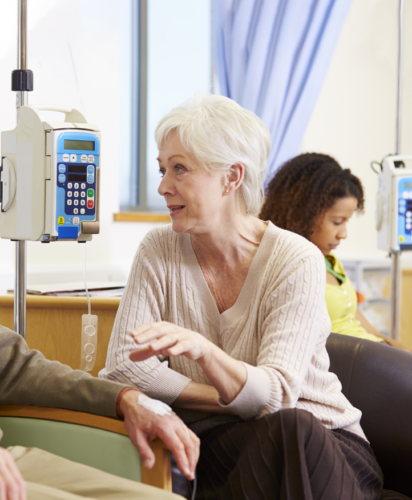
Summary
The Programme d’Optimisation du Circuit des Chimiothérapies (PROCHE) at the Georges-Pompidou European Hospital in Paris, France improved the chemotherapy process for patients by assessing possible side effects of treatment, and adjusting treatment plans before patients arrived for their next appointment.1 This procedure shortened the length of hospital sessions, reduced drug wastage, improved patient symptoms and reduced healthcare costs.1-3
Challenge
Patients undergoing chemotherapy are typically only asked about the treatment side effects they have experienced when they arrive at the hospital for their next appointment. Considerable time is then spent gathering information about any adverse events that may have occurred. Often, treatment then needs to be modified, postponed or cancelled based on this information – resulting in lost time for patients, their carers and hospital staff, as well as drug wastage and potentially lower treatment benefits.1
Solution
The Georges-Pompidou European Hospital in Paris created the Programme d’Optimisation du Circuit des Chimiothérapies (PROCHE) to improve the chemotherapy process for patients by assessing their suitability for chemotherapy before their scheduled appointments.
A hospital nurse called patients two days ahead of their scheduled chemotherapy appointment to ask about any previous adverse events. This information, along with the patient’s laboratory results, was then forwarded to the patient’s oncologist, nurse and pharmacist.
Oncologists reviewed the patient information, and pharmacists only began preparing the chemotherapy following approval from the oncologist. This process allowed oncologists to adjust treatment plans – e.g. delay sessions, organise supportive care or adapt chemotherapy protocols – before patients arrived for their appointments.1
What has it achieved?
Based on the literature, more than 3,000 patients have taken part in PROCHE.1 2
Between 2008 and 2013, 2,040 patients participated in PROCHE – representing a total of 21,920 scheduled chemotherapy appointments.2
As a result of PROCHE, many improvements have been observed:
- Fewer appointments have been cancelled
- The overall capacity of the unit has improved
- Patients reported less pain and fatigue
- Fewer chemotherapy drugs have been wasted
Results from the PROCHE clinical studies:
Initial results (1,037 participants, 2009–2011):1
- Patients in PROCHE had significantly shorter hospital sessions (61 minutes) compared with patients in standard care (131 minutes).
- Patients reported reduced pain and fatigue over the course of the study.
- Chemotherapy drug wastage dropped from 6% to 2%.
- The overall capacity of the unit improved: bed occupancy rates increased from 1.35 to 1.61 patients/bed/day.
Latest results (2,040 participants, 2008–2013):2
- Over the course of the programme, hospital sessions decreased from 116 minutes to 63 minutes.
- Patients reported significant improvements in fatigue, pain, dry skin, nausea, mucositis, hand–foot syndrome, diarrhoea, vomiting and infection.
- Drug wastage was 5.4%, compared with 10.9% in standard care.
PROCHE saved €36,932 in treatment costs over the course of 6 months.3
Further information
References:
- Scotté F, Oudard S, Aboudagga H, et al. 2013. A practical approach to improve safety and management in chemotherapy units based on the PROCHE – Programme for optimisation of the chemotherapy network monitoring program. Eur J Cancer 49(3): 541-44
- Scotté F. 2014. A network monitoring program to improve safety and management in ambulatory chemotherapy unit. ESMO 2014; 28 September 2014; Madrid
- Berhoune M, Aboudagga H, Jacob A, et al. 2011. Effect of requiring advance approval of chemotherapy on number and cost of ungiven doses. Am J Health Syst Pharm 68(7): 557-8